Topics
Category
Era
Haupers, Clement (1900–1982)
Clement Bernard Haupers was a painter, printmaker, arts administrator, and arts educator active from the 1920s to the 1980s. He is best known for his directorship of the Minnesota Works Progress Administration Federal Art Project and for his influence in the Minnesota art community.
Haupers was born in St. Paul in 1900. In 1918, he began taking courses at the Minneapolis School of Art and joined the Art League of St. Paul, organized by the artist Clara Mairs. Haupers and Mairs started an unconventional relationship, which lasted until her death in 1963. For more than forty years they traveled, exhibited, and lived together as life partners. At the same time, Haupers pursued relationships with other women and men.
Because of the difference in their ages and the ambiguity of their relationship, Mairs and Haupers remained always a bit of a Twin Cities scandal. In 1929, they established a home and studio in St. Paul’s Ramsey Hill neighborhood, a local artists’ enclave. The house itself belonged to Haupers while the land belonged to Mairs, so he had it moved from its original location on Randolph Avenue to Ramsey Hill.
In 1923, with Mairs, Haupers traveled to Paris. The 1920s in Paris were known as Les Années Folles, the Crazy Years. It was a time and place of social and artistic experimentation. This was true especially in the studios, cafés, and nightclubs of the Montparnasse district, the center of Paris’s bohemian culture. Mairs and Haupers stayed in France for two years, attending classes held by notable artists such as the sculptor Émile-Antoine Bourdelle and the Cubist painter André Lhote. A photograph taken at the Académie Montparnasse in 1923 shows Haupers, seated on the floor, with a white tie. Mairs sits on the floor to his left.
Haupers brought some of the style of Montparnasse to his work back in Minnesota. The 1926 work Two Girls, One Sailor shows the influence of Cubism and Jazz Age aesthetics in the angular faces and bodies and the strong shadows of the dancers, the violinist, and the sailor. The formal use of color and composition that Haupers developed in Paris can be seen throughout his works, from the angular red roofs of Provencale Landscape to the softer colors and trail of bright lights of View of Kellogg Boulevard From My Window. France also had an influence on other aspects of Haupers’ style. Works such as the drypoint print Three Graces show a decidedly French treatment of nudity and the body—slightly shocking to mid-century Minnesotan eyes.
Haupers became the superintendent of the Fine Arts Department of the Minnesota State Fair in 1931, a position he held until 1942. Under the previous superintendent, these exhibitions featured works brought in from galleries in New York and Chicago. In 1931, a group of local artists protested this lack of local representation in one of Minnesota’s most important art exhibitions. During a meeting with Fair officials at St. Paul’s Lowry Hotel, Haupers was, in his words, “shoved” by fellow artist Cameron Booth into leading the department. Exhibitions under Haupers stressed the importance of the growing Minnesota art scene. Juried prize shows were reinstated, as were special exhibitions representing well-known and up-and-coming local artists.
In 1935, the WPA Federal Art Project began supporting the visual arts, with Haupers as the director of the Minnesota division. Eighteen months later he became the regional director, overseeing the project in seven Midwestern states. In 1941, he moved to Washington, D.C., as the assistant to the national director, Holger Cahill. As the director of the Minnesota FAP, Haupers promoted public patronage of the visual arts and directed a program that sent art, artists, and art education all around Minnesota. He was a successful and indefatigable director and his devotion to securing projects and supporting young and established artists greatly influenced the growth of the arts in Minnesota.
In addition to his work with the State Fair and the FAP, Haupers was well known as an art educator. He began teaching in 1930s at the St. Paul Arts and Crafts Center and the St. Paul Gallery and School of Art and continued teaching until his death. His influence on decades of young artists was as instrumental in developing the visual arts in Minnesota as his administrative roles.
Haupers died on December 1, 1982, three months after his last solo exhibition.
Bibliography
Crump, Robert L. Minnesota Prints and Printmakers, 1900–1945. St. Paul: Minnesota Historical Society Press, 2009.
Hancock, Jane H. Clement Haupers: Six Decades of Art in Minnesota. St. Paul: Minnesota Historical Society Press, 1979.
Harris, Moira, Brian Szott, and Ben Gessner. Minnesota Modern: Four Artists of the Twentieth Century. Afton, MN: Afton Historical Society Press, 2015.
Hendrickson, Jr., Kenneth E. "The WPA Federal Art Projects in Minnesota, 1935–1943." Minnesota History 53, no. 5 (Spring 1993): 170–183.
http://collections.mnhs.org/MNHistoryMagazine/articles/53/v53i05p170-183.pdf
O’Sullivan, Thomas. "A Job and a Movement: The WPA Federal Art Program in Minnesota." Minnesota History 53, no. 5 (Spring 1993): 184–195.
http://collections.mnhs.org/MNHistoryMagazine/articles/53/v53i05p184-195.pdf
OH1.4
Oral history interview with Clement Haupers, June 27, 1977
Minnesota Artists Oral History Project, Oral History Collection, Minnesota Historical Society, St. Paul
Description: Haupers discusses the inception and development of FAP and his own involvement therein. He lists as long range contributions of the FAP in Minnesota and in the country at large; the preservation of a generation of artists; the creation of a substantial body of public art; and the development of a greater sense of art/beauty in the broader community. He also tells about opposition to the FAP by various (politically conservative) patrons of the arts.
OH1.5
Oral history interview with Clement Haupers, December 9, 1977
Minnesota Artists Oral History Project, Oral History Collection, Minnesota Historical Society, St. Paul
Description: Haupers discusses murals executed under the FAP in several locations in Minnesota and a number of artists and artisans, most of whom worked in FAP. He also describes his own career as an artist and administrator and refers to his dealings with other administrators of state and federal arts programs during the 1920s and 1930s. There is some repetition from the Haupers interview of June 27, 1977.
OH1.6
Oral history interview with Clement Haupers, April 3, 1981
Minnesota Artists Oral History Project. Minnesota Historical Society, St. Paul
Description: Haupers, director of the Federal Art Project in Minnesota, 1935-1942, discusses prints made by his artist colleagues and added to the collection of the Minnesota Historical Society in 1981.
P1615; M526
Clement B. Haupers and Clara Gardner Mairs papers, 1918–1985
Manuscript Collection, Minnesota Historical Society, St. Paul
Description: Correspondence and other papers of St. Paul artists Clement Haupers and Clara Gardner Mairs. Haupers was the Minnesota state director of the Federal Art Project of the Work Projects Administration (1933–1943).
Related Resources
Primary
Clement Haupers and Clara Gardner Mairs papers, 1918–1983
Manuscript Collection, Archives of American Art, Smithsonian Institution, Washington, D.C.
http://www.aaa.si.edu/collections/clement-haupers-and-clara-gardner-mairs-papers-9929
Description: Biographical material (1931–1982), correspondence (1920–1983), business records (1958–1973), subject files concerning the WPA's Federal Art Project (1934–1976) and printed material (1918–1981) reflect the activities and careers of Clement Haupers and Clara Mairs.
Secondary
Westbrook, Nicholas, ed. "Clement Haupers: Conversations on Six Decades of Painting in Minnesota." Minnesota History 46, no. 7 (Fall 1979): 296–299. http://collections.mnhs.org/MNHistoryMagazine/articles/46/v46i07p296-299.pdf
Related Images
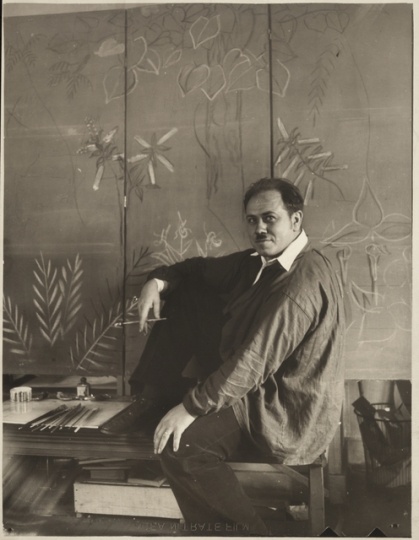
Clement Haupers in his studio
Holding Location
Articles
More Information
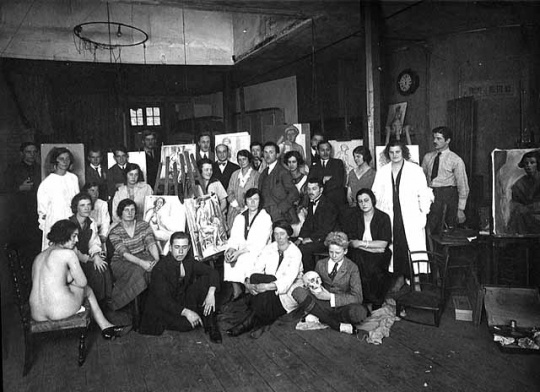
Clement Haupers and Clara Mairs in Andre L’hote’s art class, Paris
Holding Location
More Information
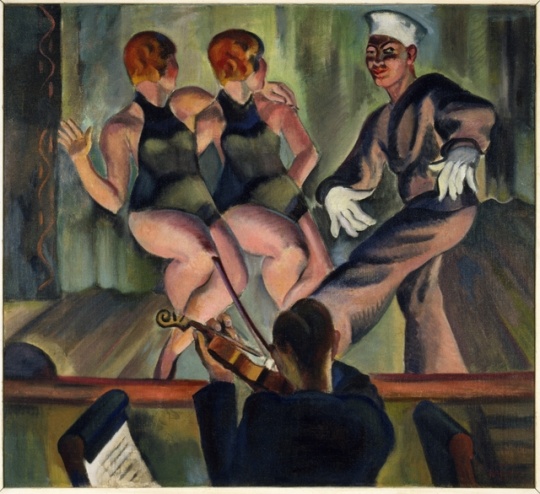
"Two Girls, One Sailor"
Two Girls, One Sailor, 1926. Oil on canvas by Clement Haupers.
Holding Location
Articles
More Information
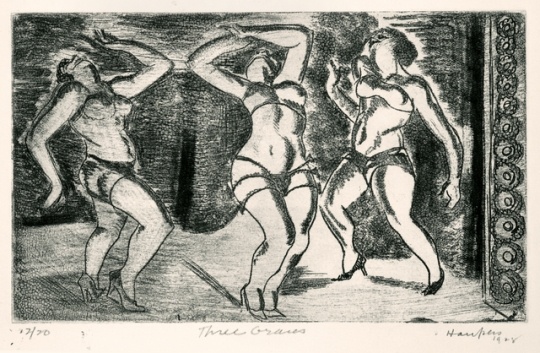
"Three Graces"
Three Graces, 1928. Drypoint etching on paper by Clement Haupers.
Holding Location
Articles
More Information
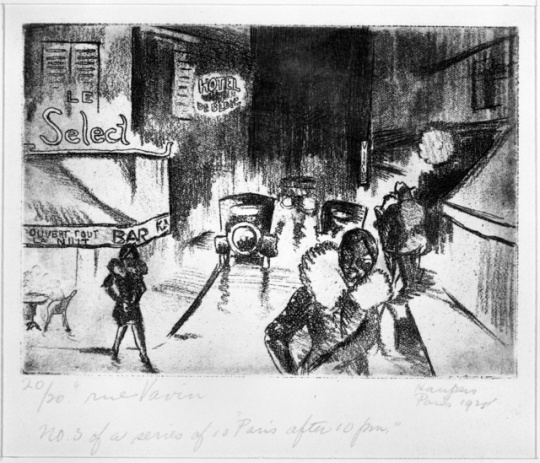
"Rue Vavin"
Rue Vavin, 1928. Drypoint etching on paper by Clement Haupers.
Holding Location
Articles
More Information
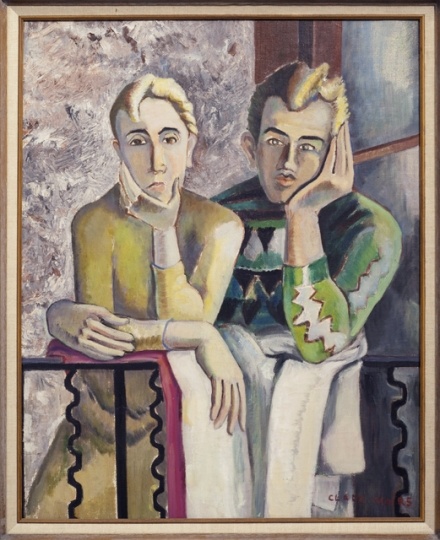
"Clara and Clem"
Clara and Clem, c.1930. Oil on canvas painting by Clara Mairs.
Holding Location
More Information
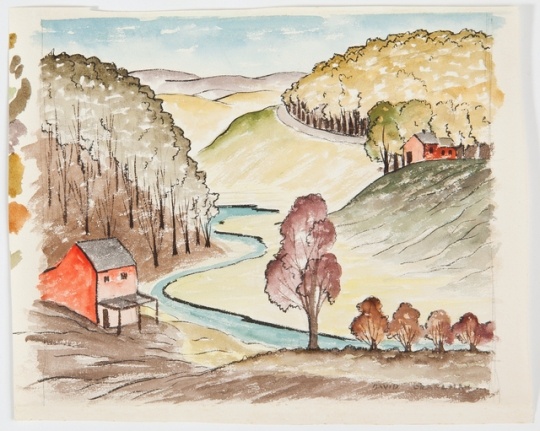
"Provencale Landscape"
Provencale Landscape, c.1933. Oil on board by Clement Haupers.
Holding Location
Articles
More Information
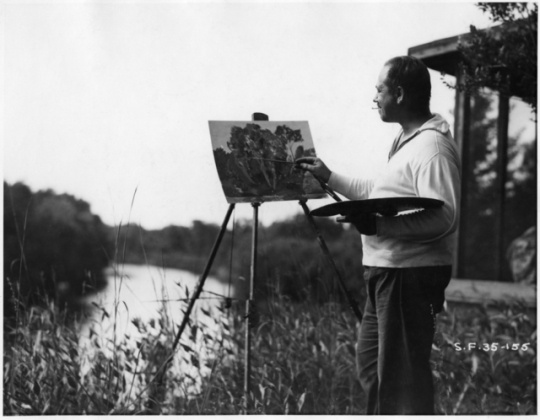
Clement Haupers painting at Rutledge
Holding Location
Articles
More Information
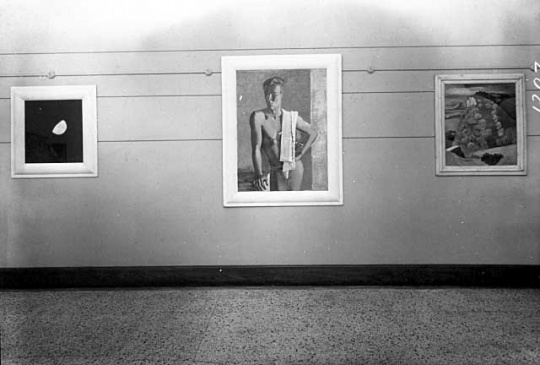
Paintings by Clement Haupers on exhibit
Holding Location
Articles
More Information
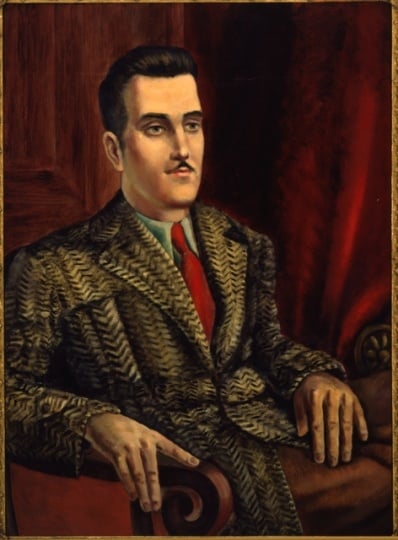
"Carroll Simmons"
Carroll Simmons, c.1940. Oil on masonite by Clement Haupers.
Holding Location
Articles
More Information
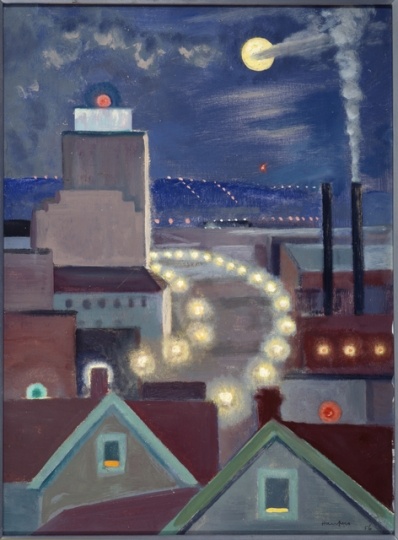
"View of Kellogg Blvd. From My Window"
View of Kellogg Blvd. From My Window, 1956. Oil on board by Clement Haupers.
Holding Location
Articles
More Information
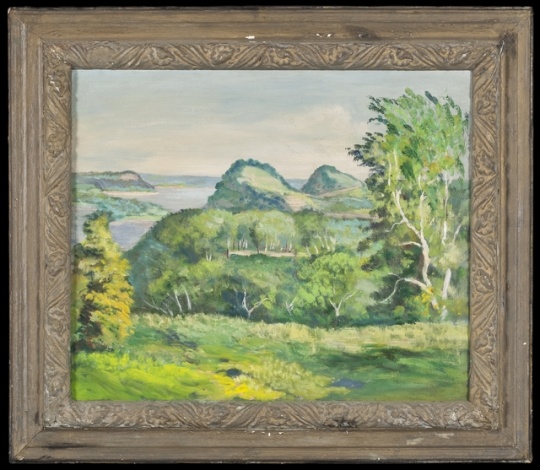
"Memorial Heights Park Red Wing"
Memorial Heights Park Red Wing, 1960. Oil on board by Clement Haupers.
Holding Location
Articles
More Information
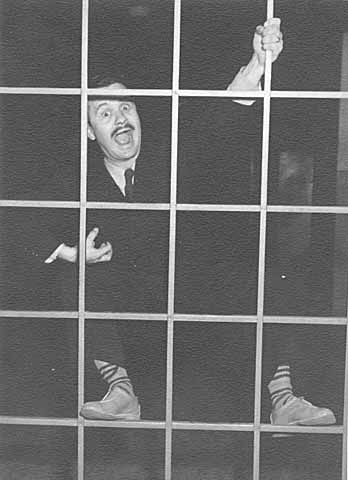
Clement Haupers clowning around
Holding Location
Articles
More Information
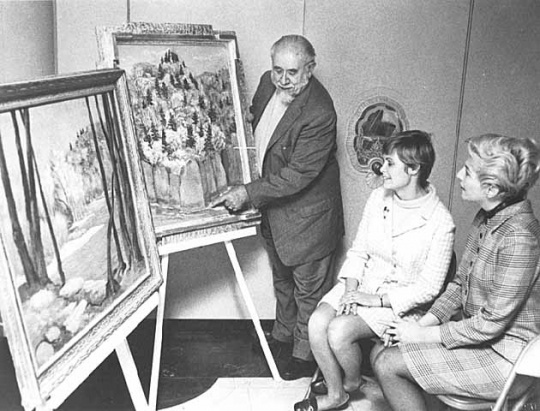
Clement Haupers giving a lecture on the St. Croix river
Holding Location
Articles
More Information
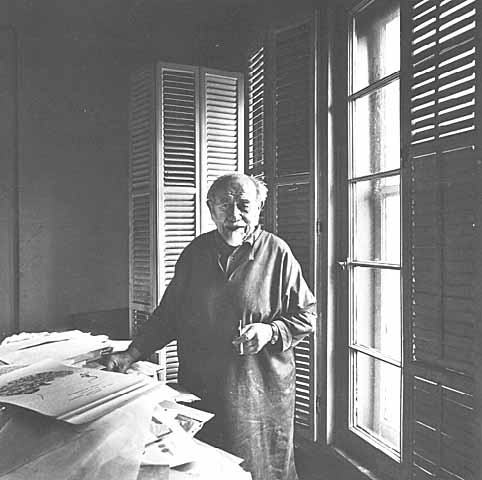
Clement Haupers in his studio, 1975
Holding Location
Articles
More Information
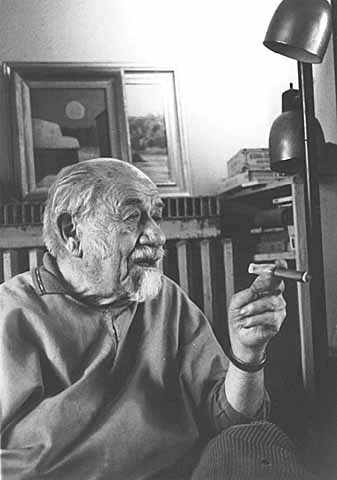
Clement Haupers
Holding Location
Articles
More Information
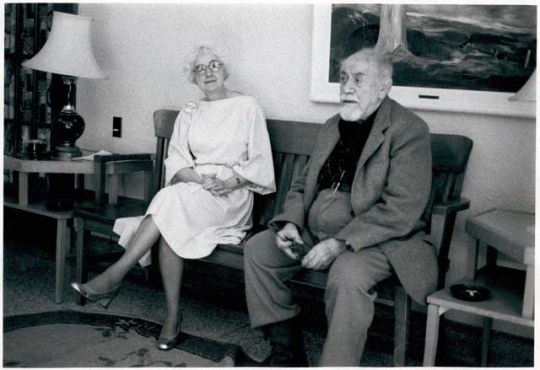
Clement Haupers with Muriel Oliver
Holding Location
Articles
More Information
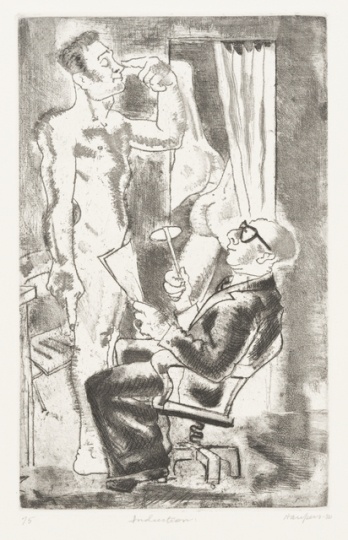
"Induction"
Etching on paper by Clement Haupers depicting an induction examination at Fort Snelling ca. 1940; created in 1981.
Holding Location
Articles
More Information
Related Articles
Turning Point
In 1935, Haupers becomes the director of the Minnesota WPA Federal Art Project.
Chronology
1900
1918
1921
1921
1923
1925
1928
1931
1935
1942
1943
1949
1970
1979
1982
Bibliography
Crump, Robert L. Minnesota Prints and Printmakers, 1900–1945. St. Paul: Minnesota Historical Society Press, 2009.
Hancock, Jane H. Clement Haupers: Six Decades of Art in Minnesota. St. Paul: Minnesota Historical Society Press, 1979.
Harris, Moira, Brian Szott, and Ben Gessner. Minnesota Modern: Four Artists of the Twentieth Century. Afton, MN: Afton Historical Society Press, 2015.
Hendrickson, Jr., Kenneth E. "The WPA Federal Art Projects in Minnesota, 1935–1943." Minnesota History 53, no. 5 (Spring 1993): 170–183.
http://collections.mnhs.org/MNHistoryMagazine/articles/53/v53i05p170-183.pdf
O’Sullivan, Thomas. "A Job and a Movement: The WPA Federal Art Program in Minnesota." Minnesota History 53, no. 5 (Spring 1993): 184–195.
http://collections.mnhs.org/MNHistoryMagazine/articles/53/v53i05p184-195.pdf
OH1.4
Oral history interview with Clement Haupers, June 27, 1977
Minnesota Artists Oral History Project, Oral History Collection, Minnesota Historical Society, St. Paul
Description: Haupers discusses the inception and development of FAP and his own involvement therein. He lists as long range contributions of the FAP in Minnesota and in the country at large; the preservation of a generation of artists; the creation of a substantial body of public art; and the development of a greater sense of art/beauty in the broader community. He also tells about opposition to the FAP by various (politically conservative) patrons of the arts.
OH1.5
Oral history interview with Clement Haupers, December 9, 1977
Minnesota Artists Oral History Project, Oral History Collection, Minnesota Historical Society, St. Paul
Description: Haupers discusses murals executed under the FAP in several locations in Minnesota and a number of artists and artisans, most of whom worked in FAP. He also describes his own career as an artist and administrator and refers to his dealings with other administrators of state and federal arts programs during the 1920s and 1930s. There is some repetition from the Haupers interview of June 27, 1977.
OH1.6
Oral history interview with Clement Haupers, April 3, 1981
Minnesota Artists Oral History Project. Minnesota Historical Society, St. Paul
Description: Haupers, director of the Federal Art Project in Minnesota, 1935-1942, discusses prints made by his artist colleagues and added to the collection of the Minnesota Historical Society in 1981.
P1615; M526
Clement B. Haupers and Clara Gardner Mairs papers, 1918–1985
Manuscript Collection, Minnesota Historical Society, St. Paul
Description: Correspondence and other papers of St. Paul artists Clement Haupers and Clara Gardner Mairs. Haupers was the Minnesota state director of the Federal Art Project of the Work Projects Administration (1933–1943).
Related Resources
Primary
Clement Haupers and Clara Gardner Mairs papers, 1918–1983
Manuscript Collection, Archives of American Art, Smithsonian Institution, Washington, D.C.
http://www.aaa.si.edu/collections/clement-haupers-and-clara-gardner-mairs-papers-9929
Description: Biographical material (1931–1982), correspondence (1920–1983), business records (1958–1973), subject files concerning the WPA's Federal Art Project (1934–1976) and printed material (1918–1981) reflect the activities and careers of Clement Haupers and Clara Mairs.
Secondary
Westbrook, Nicholas, ed. "Clement Haupers: Conversations on Six Decades of Painting in Minnesota." Minnesota History 46, no. 7 (Fall 1979): 296–299. http://collections.mnhs.org/MNHistoryMagazine/articles/46/v46i07p296-299.pdf



















